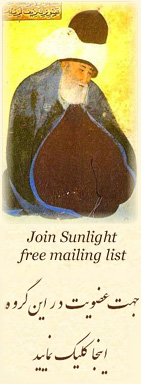Here, Sunlight offers Ghazal (Ode) 1095, from Rumi's Diwan-e
Shams, in a version by Kabir Helminski, and in translation by A.J.
Arberry:
^ ^ ^ ^ ^
"Sweep the Dust off the Sea"
The Beautiful One handed me a broom and said,
"Sweep the dust from the sea!",
then burned the broom in the fireplace and said,
"Give me back my broom."
Bewildered, I put my head to the ground.
"In real submission there's no longer
even someone to bow."
"But how?"
"Without hesitation or anything of yourself."
I bared my neck and said,
"Sever me from myself with Ali's sword."
But as I was struck, and struck again,
countless heads appeared.
As if I were a lamp, and each head a wick,
flames rose on every side,
countless candle-eyed heads,
a procession spanning East and West.
But what is East or West within placelessness?
It's all a furnace and a bath house.
Your heart is cool; how long will you lie in this
warm bath house?
Leave the bath house and its stove.
Undress yourself in the inner world
and appreciate the frescoes, the beautiful figures,
colored with the hues of the tulip bed;
look towards the window that lets in the light.
The six directions are the bath house,
and a window opens toward the placeless.
Above it is the beauty of a Sovereign
from whose reflection the earth and the sky
received their color, from Whom soulfulness
has rained down upon the Turk and Zanzibari.
The day is gone, and my story ends.
Night and day are shamed by my beauty's story.
The sun of Tabriz keeps me
drunk and languishing in this state.
-- Version by Kabir Edmund Helminski
"Love is a Stranger"
Threshold Books, 1993
~~~~~~~~~~~~~~~~~~~~~~~~~~~~
That beauty handed me a broom saying, "Stir up the dust from
the sea!"
He then burned the broom in the fire saying, "Bring up the
broom out of the fire!"
In bewilderment I made prostration before him; he said,
"Without a prostrator, offer a graceful prostration!"
"Ah, how prostrate with out a prostrator?" He said, "Uncondi-
tionally, without personal impulse."
I lowered my neck and said, "Cut off the head of a prostrator
with Dhu 'l-Faqar."*
The more he struck with the sword, the more my head grew,
till heads a myriad sprouted from my neck.
I was a lamp, and every head of mine was a wick; sparks
flew on every side.
Candles sprang out of my heads, east to west was filled
with the train.
What are east and west in the placeless? A dark bath-stove,
and a bath at work.*
You whose temperament is cold, where is the anxiety of your
heart? How long is this dwelling at rest in these baths?
Go forth from the baths and enter not the stove*; strip yourself,
and look upon those paintings and figures.*
Until you behold the ravishing figures, until you behold the
hues of the tulip-bed.
When you have beheld, look toward the window, for that
beauty became a beauty through the reflection of the window.
The six directions are the bath, and the window is the place-
less; above the window is the beauty of the Prince.
Earth and water acquired colour from his reflection, soul
rained on Turk and Zanzibari.
The day is gone, and my story has not grown short -- O night
and day put to shame by this tale!
King Shams al-Din-i Tabrizi keeps me intoxicated, crop-sick-
ness upon crop sickness.
-- Translation by A.J. Arberry
"Mystical Poems of Rumi 1"
University of Chicago Press, 1979
* Dhu 'l-Faqar -- Ali's sword, symbolizing death.
* "enter not the stove" -- for the comparson of the world with a bath-
stove, see Mathnawi IV: 238-56.
* "Paintings and figures" - Persian baths were decorated with
frescoes; the symbol is of material forms of spiritual beauty.
~~~~~~~~~~~~~~~~~~~~~~~~~~~~
The media:
^ ^ ^ ^ ^
~







1 comment:
Wonderful :) And I liked the way the two translations complemented each other, the new and the post-victorian one of Arberry.
Ya Haqq!
Post a Comment